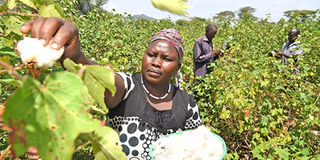Kendu Bay ginnery signals new start for cotton growers

Farmers harvest cotton. The government has moved to establish a ginnery in Kendu Bay, Homa Bay County to promote cotton farming in Nyanza. PHOTO | FILE | NATION MEDIA GROUP
What you need to know:
- The crop supported thousands of families, enabling them to educate their children and have better healthcare. But the industry collapsed following the closure of Kisumu Cotton Millers (Kicomi), Rivatex and several local ginneries.
- The by-products include cooking oil and animal feeds. The chaff can also be used in making briquettes used for cooking.
- The PS told local leaders to embrace cotton farming by setting aside pieces of land for planting the crop as an example.
- Fanuel Lubanga from the Ministry of Agriculture told farmers that they will get extension support to prevent their crop from suffering due to pest and disease attacks.
The government has moved to establish a ginnery in Kendu Bay, Homa Bay County to promote cotton farming in Nyanza.
Principal secretary in the State Department of Industrialisation Francis Owino, Homa Bay Woman rep Gladys Wanga and Rivatex managing director Thomas Kipkurgat inspected the site after meeting cotton farmers in the region recently.
Owino said the land will be used for setting up a ginnery that will help revive cotton farming.
He said the region would become a major producer of cotton soon after the establishment of the facility due to better climatic conditions and good soils that promote growing of the crop. Several households in the region in the past relied on cotton farming.
The cash crop was grown in Karachuonyo, Ndhiwa and Suba in Homa Bay County, Nambale in Busia County and Asembo, Ndere and Rang’ala in Siaya County.
The crop supported thousands of families, enabling them to educate their children and have better healthcare. But the industry collapsed following the closure of Kisumu Cotton Millers (Kicomi), Rivatex and several local ginneries.
Farmers who still plant the crop send their harvest to ginneries in Meru, Kitui and Baringo for processing.
Wanga said farmers get huge losses when transporting their crops to other counties.
"The industry is infiltrated by middlemen who buy cotton from local farmers at low prices and take them to other counties. Farmers do not get what they deserve,” she said.
She added that transportation of cotton to other counties makes farmers loss byproducts provided by the crop.
The by-products include cooking oil and animal feeds. The chaff can also be used in making briquettes used for cooking.
TRAINING TO REGISTERED GROUPS
"Why would a local cotton farmer suffer after months of hard labour? The establishment of the local ginnery will promote value chain addition because the growers would maximise on the benefits they get from their economic activities," Wanga said.
Owino noted the ginnery will start processing cotton in October after the government secures the title of the land.
"We will give seeds to cotton farmers for the next planting season. After harvesting, their cotton will first be processed at the ginnery. It will then be taken to Rivatex to make fabric," he said.
He asked Kenyans to embrace locally produced fabrics made from home-grown cotton.
The PS told local leaders to embrace cotton farming by setting aside pieces of land for planting the crop as an example.
"Local chiefs have already been instructed to plant cotton as an example to the people they represent. Political leaders should also be an example to their electorates," Owino said.
Kipkurgat said currently, Rivatex is importing cotton from Tanzania and Uganda to sustain demand.
He said the institution will buy certified cotton seeds for farmers for the next planting season that starts this month
"A farmer will be able to get between 200 to 300kg of cotton per acre from the seeds currently available. We want the yield to increase to more than 1,000 kilos per acre when we start introducing hybrid seeds next year," he said, adding that Rivatex offers training to registered groups interested in making fabric.
Fanuel Lubanga from the Ministry of Agriculture told farmers that they will get extension support to prevent their crop from suffering due to pest and disease attacks.
He said the government will buy chemicals to control the spread of diseases affecting cotton.
During the tour, 1,000 lesos made by Rivatex were distributed to women in Karachuonyo.





